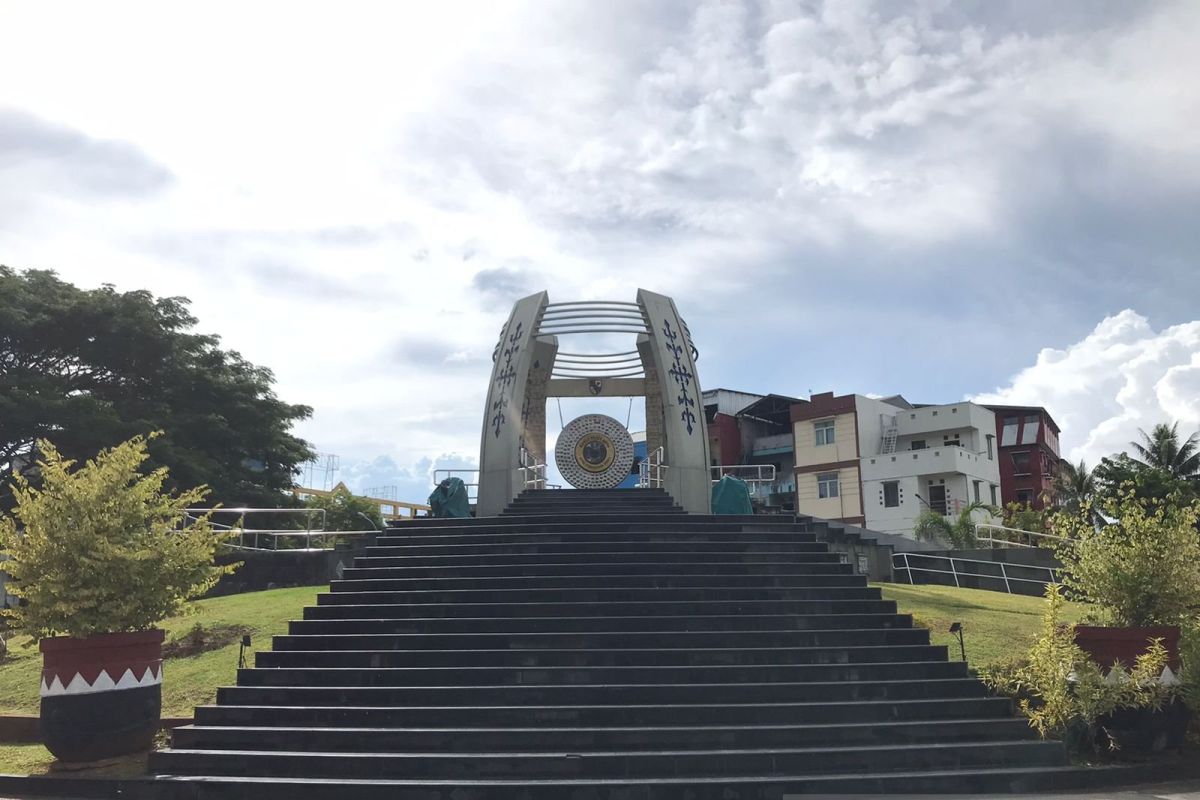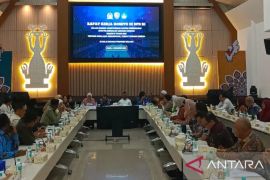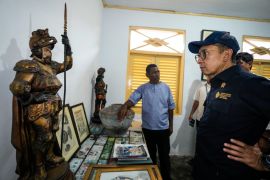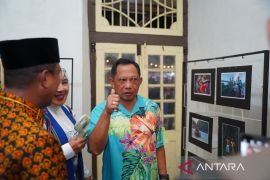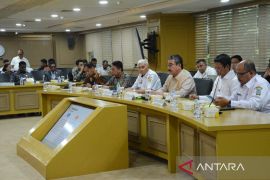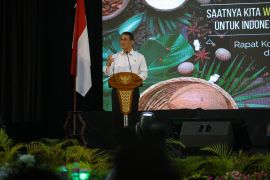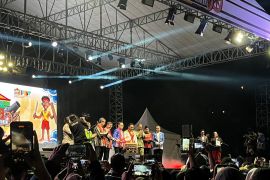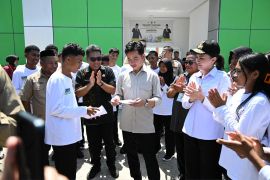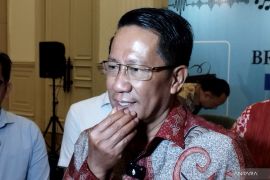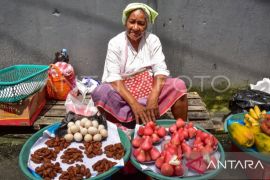The concept of "Ale rasa beta rasa," which advocates mutual respect, is well-known by the people of Maluku region. After all, they all have been striving to maintain strong bonds of brotherhood for 25 years now.
For the people of Maluku, or Moluccans, "Ale rasa beta rasa" is much more than a saying that promotes friendship and brotherhood: it underlines a peace that was forged in the aftermath of a tragic episode in the past.
January 19, 1999, is not a date that Moluccans can easily forget. On that day, a violent conflict broke out in the region, disrupting people's unity.
However, since Moluccans share the same understanding of brotherhood, the conflict did not spawn prolonged resentment. Instead, it pushed Maluku people to further strengthen their bonds of unity and brotherhood.
Pushing aside differences in background, race, and religion, the people of Maluku managed to restore peace and bury the conflict that threatened to tear them apart.
The restoration of peace in Maluku cannot be separated from strong cultural values shared among Moluccans, even after the conflict erupted. Moreover, every tribe in Maluku values pela gandong highly, a traditional conflict resolution process that put an end to the violent conflict in 1999.
Different communities in Maluku have been successful in maintaining harmony, regardless of their residential areas, backgrounds, and religion. It is this strong brotherhood that paved the way for reconciliation among conflicting parties in the past.
Post-conflict reconciliation
According to Professor Jhon Ruhulessin of the Indonesian Christian University of Maluku, Ambon city, social disputes in Maluku have become part of the history of the region, providing priceless lessons and experiences for Moluccans as well as the Indonesian nation as a whole.
"Without such lessons, we might have taken wrong turns in living our lives within a pluralistic nation that adheres to the Pancasila and the 1945 Constitution," he said.
Ruhulessin invited all elements of society to relentlessly solidify their ties and learn from the conflict that broke out 25 years ago.
"Let us all affirm our national and Moluccan commitments to preparing for the future. We should remember that a conflict will lead to new issues and more violent acts instead of resolving the root of the problem," he added.
He further emphasized the importance of taking social and cultural aspects into account in development efforts in Maluku for the sake of safeguarding the tolerance of people of different religions in the region.
Concurring with Ruhulessin, head of the Center for Reconciliation and Mediation of Maluku, Dr. Abidin Wakano, said that the people of Maluku should respond to social dynamics in a smart and prudent manner. He urged the public against being easily provoked by rumors spread by irresponsible parties.
He described the humanitarian conflict in Maluku in 1999 as one of the biggest civilian conflicts in the 20th century, considering that the event claimed many lives and resulted in significant material losses.
However, the lecturer at the State Islamic Institute (IAIN) of Ambon dismissed predictions that it would take Maluku 20–50 years to recover from the conflict. In fact, he said, the region has managed to rise back much quicker than predicted.
"Only within several years, we have managed to record notable successful stories that can inspire all people," he affirmed.
Thus, Maluku should be seen as a kind of "laboratory" for people to learn how to bring peace into reality within a short period of time. There are, however, several things that still need to be addressed by Moluccans through collaboration.
Discussions on the tragic conflict and tolerance in Maluku will be incomplete without paying attention to the condition of vulnerable groups, such as women and children.
In the midst of rising tensions, Sister Brigita Renyaan came up with the Gerakan Perempuan Peduli, or Caring Women's Movement, to consolidate interfaith women in an effort to bring an end to the conflict. Once again, it was their solid fellowship that encouraged the people of every group in Maluku to take part in fighting for the restoration of peace in their homeland.
Innovative intervention
Public relations head of the Maluku Regional Police, M. Rum Ohoirat, said that the conflict in the region brought significant losses and destruction. According to him, no official data was released on the actual number of victims of the conflict.
However, the Indonesian Survey Institute (LSI) estimated that the conflict claimed 8 thousand to 9 thousand lives, displaced 700 thousand people, and led to the destruction and burning of thousands of buildings, including houses, stores, mosques, churches, government offices, and banks.
"Back then, brotherly people hurt and killed each other. We could not feel a peaceful and harmonious life," Ohoirat recalled.
Bearing that in mind, the Maluku Regional Police devised an innovative program called Basudara Manise to create a safe, peaceful, and prosperous Maluku, he informed.
"Basudara Manise refers to the efforts aimed at maintaining brotherhood in Maluku that, in turn, is expected to lead to safety and prosperity. We are implementing the program by establishing coordination with youths, religious figures, and community figures to properly respond to various matters, including the 2024 General Elections," he expounded.
A quarter of a century has passed since the conflict erupted, and the people of Maluku have agreed to continue to strengthen ties to live in harmony amid diversity for the present and the future.
Related news: Interfaith prayer pacified communal conflict in Maluku
Related news: Afghan delegation gains insights into conflict resolution in Maluku
For the people of Maluku, or Moluccans, "Ale rasa beta rasa" is much more than a saying that promotes friendship and brotherhood: it underlines a peace that was forged in the aftermath of a tragic episode in the past.
January 19, 1999, is not a date that Moluccans can easily forget. On that day, a violent conflict broke out in the region, disrupting people's unity.
However, since Moluccans share the same understanding of brotherhood, the conflict did not spawn prolonged resentment. Instead, it pushed Maluku people to further strengthen their bonds of unity and brotherhood.
Pushing aside differences in background, race, and religion, the people of Maluku managed to restore peace and bury the conflict that threatened to tear them apart.
The restoration of peace in Maluku cannot be separated from strong cultural values shared among Moluccans, even after the conflict erupted. Moreover, every tribe in Maluku values pela gandong highly, a traditional conflict resolution process that put an end to the violent conflict in 1999.
Different communities in Maluku have been successful in maintaining harmony, regardless of their residential areas, backgrounds, and religion. It is this strong brotherhood that paved the way for reconciliation among conflicting parties in the past.
Post-conflict reconciliation
According to Professor Jhon Ruhulessin of the Indonesian Christian University of Maluku, Ambon city, social disputes in Maluku have become part of the history of the region, providing priceless lessons and experiences for Moluccans as well as the Indonesian nation as a whole.
"Without such lessons, we might have taken wrong turns in living our lives within a pluralistic nation that adheres to the Pancasila and the 1945 Constitution," he said.
Ruhulessin invited all elements of society to relentlessly solidify their ties and learn from the conflict that broke out 25 years ago.
"Let us all affirm our national and Moluccan commitments to preparing for the future. We should remember that a conflict will lead to new issues and more violent acts instead of resolving the root of the problem," he added.
He further emphasized the importance of taking social and cultural aspects into account in development efforts in Maluku for the sake of safeguarding the tolerance of people of different religions in the region.
Concurring with Ruhulessin, head of the Center for Reconciliation and Mediation of Maluku, Dr. Abidin Wakano, said that the people of Maluku should respond to social dynamics in a smart and prudent manner. He urged the public against being easily provoked by rumors spread by irresponsible parties.
He described the humanitarian conflict in Maluku in 1999 as one of the biggest civilian conflicts in the 20th century, considering that the event claimed many lives and resulted in significant material losses.
However, the lecturer at the State Islamic Institute (IAIN) of Ambon dismissed predictions that it would take Maluku 20–50 years to recover from the conflict. In fact, he said, the region has managed to rise back much quicker than predicted.
"Only within several years, we have managed to record notable successful stories that can inspire all people," he affirmed.
Thus, Maluku should be seen as a kind of "laboratory" for people to learn how to bring peace into reality within a short period of time. There are, however, several things that still need to be addressed by Moluccans through collaboration.
Discussions on the tragic conflict and tolerance in Maluku will be incomplete without paying attention to the condition of vulnerable groups, such as women and children.
In the midst of rising tensions, Sister Brigita Renyaan came up with the Gerakan Perempuan Peduli, or Caring Women's Movement, to consolidate interfaith women in an effort to bring an end to the conflict. Once again, it was their solid fellowship that encouraged the people of every group in Maluku to take part in fighting for the restoration of peace in their homeland.
Innovative intervention
Public relations head of the Maluku Regional Police, M. Rum Ohoirat, said that the conflict in the region brought significant losses and destruction. According to him, no official data was released on the actual number of victims of the conflict.
However, the Indonesian Survey Institute (LSI) estimated that the conflict claimed 8 thousand to 9 thousand lives, displaced 700 thousand people, and led to the destruction and burning of thousands of buildings, including houses, stores, mosques, churches, government offices, and banks.
"Back then, brotherly people hurt and killed each other. We could not feel a peaceful and harmonious life," Ohoirat recalled.
Bearing that in mind, the Maluku Regional Police devised an innovative program called Basudara Manise to create a safe, peaceful, and prosperous Maluku, he informed.
"Basudara Manise refers to the efforts aimed at maintaining brotherhood in Maluku that, in turn, is expected to lead to safety and prosperity. We are implementing the program by establishing coordination with youths, religious figures, and community figures to properly respond to various matters, including the 2024 General Elections," he expounded.
A quarter of a century has passed since the conflict erupted, and the people of Maluku have agreed to continue to strengthen ties to live in harmony amid diversity for the present and the future.
Related news: Interfaith prayer pacified communal conflict in Maluku
Related news: Afghan delegation gains insights into conflict resolution in Maluku
Editor: Rahmad Nasution
Copyright © ANTARA 2024
